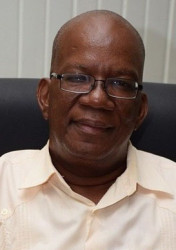Now that the report of the Commission of Inquiry into the Public Service has been completed and handed over to the President there should be no further delay to engagement between the government and the union or unions concerned on the matter of public servants’ salaries, General Secretary of the Guyana Trades Union Congress (GTUC) Lincoln Lewis has told the Stabroek Business.

“Let’s face it. Public servants pay have been, perhaps, the biggest labour-related injustices in our recent history. More than that it really is a matter of the government honoring a commitment made by the President regarding the commencement of the negotiations at a time close to the handing over of the COI’s report. Now that the COI has been handed over there is really nothing to wait for,” Lewis said.
Asked about the need for a period of time within which to allow the two sides to prepare for what, effectively, is expected to be a return to collective bargaining between the government and its employees, Lewis said that while one expects that there will have to be a preparatory process “It is important that we do not move to a position where the issue of preparation becomes one of needless delay in commencing the negotiations. I believe that the most important issue here is ensuring that our public servants do not have to wait beyond the many years that they have already been waiting to experience a meaningful pay increase. At any rate, Lewis reasoned, “It would surprise me greatly if the Guyana Public Service Union has not at least begun to prepare for these negotiations knowing that they are imminent.”

The GTUC General Secretary said he considers the start of negotiations on public service pay “a historic landmark” in contemporary industrial relations in Guyana. “Obviously, it would mark a welcome return from years of government delinquency as far as upholding the sacred principle of collective bargaining is concerned. It really is a matter, we hope, of returning to a condition of normalcy as far as employer/employee negotiations are concerned.
Accordingly, Lewis said, the negotiations will be monitored both inside and outside Guyana to see if and when Guyana takes that important step. More than that and setting aside the negotiations on public servants’ wages and salaries, “We will have to see whether a precedent will be set that will allow for free and unhindered negotiations between trade unions and other entities in which government has a stake. So that these forthcoming negotiations are about more than public servants. They are about the setting of a significant precedent,” Lewis said.
And according to Lewis, the completion of the COI report and the now imminent negotiations on public servants’ salaries are important in more ways than one. “From the standpoint of the COI report, I am aware, based on having given evidence to the COI myself that much of the discussion centred around the issue of unhealthy political control of the public service, which in some instances extends to some questionable contract appointments. There is also the issue of whether… the composition of the Public Service Commission has not, in many instances, militated against fairness in the decision-making process by that body. We have to wait and see what the contents of the report will be and what position the government will take on the various recommendations put to it by the COI. My sense is that during the deliberations of the COI there was a strong desire on the part of both the witnesses and the Commissioners that there be a transformation that removes some of the political controls that have affected the performance of the public service over the years.”
During his conversation with the Stabroek Business Lewis said he was particularly concerned both about the process of negotiations between government and the unions over wages and salaries as well as the unfolding implementation of the recommendations of the COI. “I think it would be a mistake to even think that a pay increase alone would solve the problems of the public service. Poor pay has had its consequences. There have also been issues that have nothing to do with pay. These have combined to make the public service an institution that needs help and it is the government’s responsibility to allow the public service every opportunity to reinvent itself. There is a need to look at some of the poor conditions in which public servants work, the way juniors are treated by their superiors and the need for training. I have not heard much about the Public Service Training School recently but it would be good to know just where we are with that institution since, as I recall, some persons were identified to staff the institution several months ago.”
Lewis said, meanwhile, that it was not his expectation that the remarks made by Finance Minister Winston Jordan about excessive wages demands would compromise the smooth progress of the negotiation. “No one expects that these negotiations would be fanciful and that they would proceed outside the framework of what, on the one hand, is realistically affordable and what, on the other, what constitutes a deserving wage. I say, like I have said before, however, that the minister’s intervention was awkward and inappropriate. That is behind us. We must move forward.”





